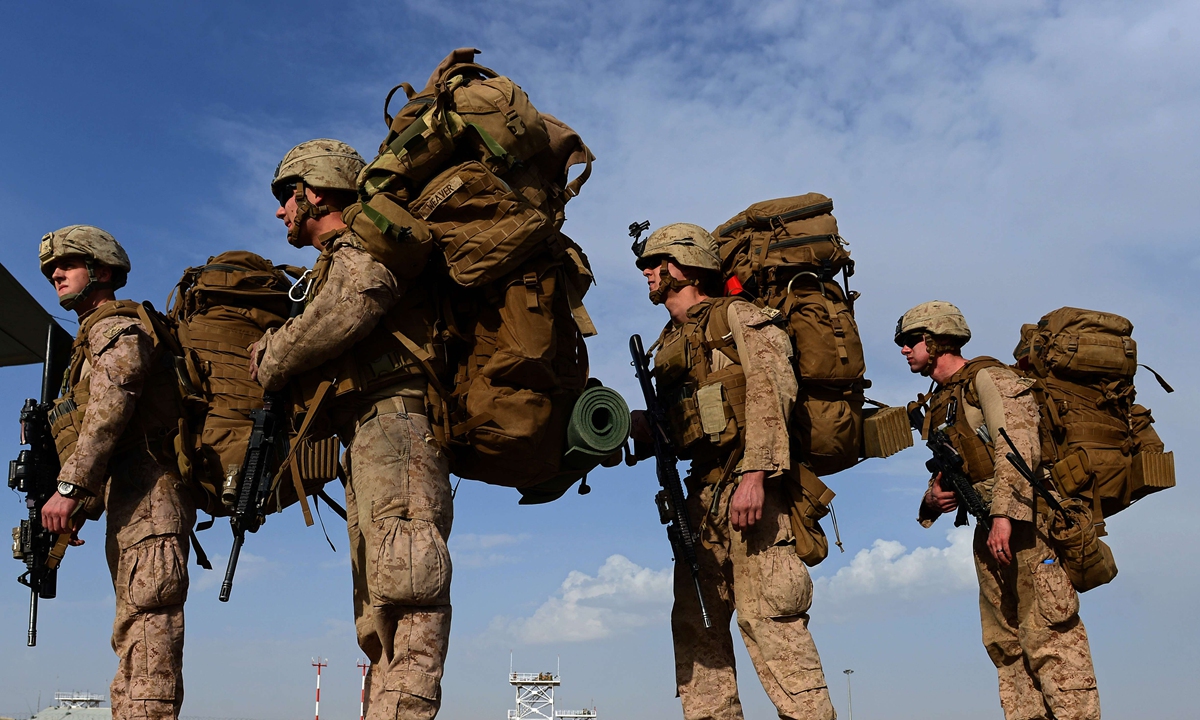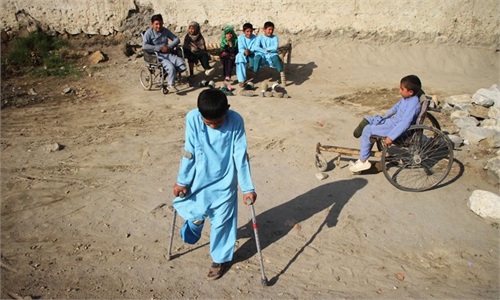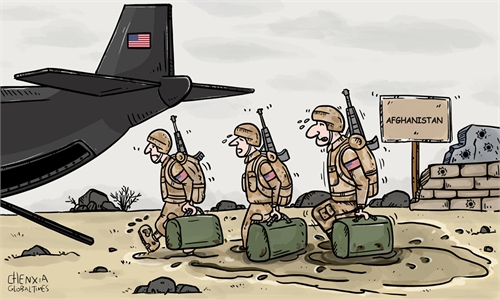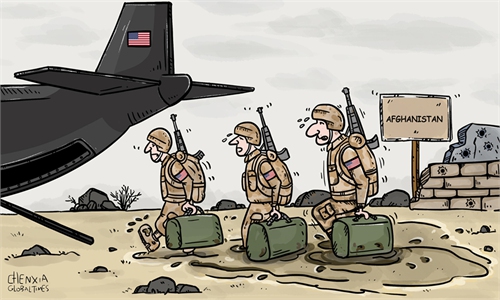
US Marines head to Kandahar as Britis and US forces withdraw from the Camp Bastion-Leatherneck complex in Lashkar Gah in Helmand province on October 27, 2014. File Photo: VCG
US President Joe Biden announced last month of the intended withdrawal of American troops from Afghanistan before September 11, after spending nearly two decades in the country fighting the "longest war" in US history.
While the US is trying to get itself out of the morass it first started, it's now the innocent Afghan people to bear the brunt of the US' ruthless behavior, experts said.
"With [the] start of US troop pullout, the level of violence has increased as the Taliban has intensified its attacks. If the US troop pullout takes place before the fruition of peace talks, the security situation is likely to deteriorate," Daily Outlook Afghanistan's Hujjatullah Zia told the Global Times.
According to Zia, no breakthrough has been made regarding peace and security in Afghanistan by the US over the past two decades.
"There is a vague picture about the outcome of US withdrawal and the future is not really promising. Responsible withdrawal is needed," he said, urging the US government to be responsible.
Several days ago, China's State Councilor and Foreign Minister Wang Yi expressed concern and demanded foreign troops to withdraw from Afghanistan in an orderly and responsible manner to ensure a smooth transition with regards to the situation in Afghanistan at a meeting with five foreign ministers from Central Asian countries.
Zia told the Global Times that currently in Afghanistan, a sense of public disappointment is in the air as Afghans have lost their trust in the Biden administration.
The war on terror has failed and the US could not stabilize Afghanistan. After 20 years, US troops are seeking withdrawal without any major achievements, he said.
The US initiated the war in Afghanistan back in October 2001 in a bid to destroy Al-Qaeda following the September 11 terror attacks.
Some analysts pointed out that the withdrawal of US troops from Afghanistan at this time is to transfer its attention to superpower rivalries. However, this irresponsible withdrawal could further deteriorate the security and political situation in Afghanistan, and could even foment extreme terrorist forces around the world.
Li Haidong, a professor at the Institute of International Relations at China Foreign Affairs University, told the Global Times that one reason for the collapse of public security in Afghanistan is because the US has overestimated its ability to rebuild a country, which has now been proven a failure.
Over the past two decades, US troops and those of its allies were sent to Afghanistan to support Afghanistan's public security and during this process, it tried to cultivate a pro-America regime. "But this is totally a failure," he said.
Afghanistan has been mired in chaos and misery over the past 20 years. The war has killed at least 100,000 civilians and left the country's political and economic systems in dire straits.
The US wanted to build a new, more palatable Afghanistan to American self-interests, but it did not devote enough resources to rebuilding Afghanistan. Only with its troops in the country, the US only maintained a semblance of stability in Afghanistan, Li said.
"The withdrawal of troops at this time shows that the US has realized its Afghan policy is a failure. At the same time, it also wants to move more resources to the Western Pacific region and focus on strategic competition with China," he noted.
Bilal Shaukat, a researcher at the Institute of Peace and Conflict Studies, University of Peshawar, told the Global Times in a previous interview that if the aim of initiating the war was only to eliminate the Al-Qaeda, then the US troops were successful. But in a broader sense, this "counterterrorism war" is a failure, as the US achieved nothing from it and terrorist attacks persist.
He noted that if the US had invested the large sums of money it spent on this war into other areas such as education, medical care, and other humanitarian activities in Afghanistan, the benefits of the money would be incalculable.
But the reality stands in stark contrast to this. Currently, Afghanistan's GDP per capita is only more than $580. The Global Times reporter also learned that people's livelihoods in Afghanistan have not changed significantly in the past years.
Despite the turmoil it caused in Afghanistan, US officials tried to link its withdrawal to China.
Bloomberg reported that US Secretary of State, Antony Blinken, said that withdrawing US troops from Afghanistan meshes with the Biden administration's goal of focusing resources on China and the COVID-19 pandemic.
Analysts pointed out that both supporters and opponents of the withdrawal in the US cited China as a cause in order to rally more support as taking a hard-line stance toward China has become de rigueur. But it only reflects the sinister Cold War mentality of some Americans and serves no purpose in settling the current Afghan crisis.
In comparison to irresponsible US deeds, China underlines that the Afghan issue can only be resolved by political means and the future of Afghanistan should be left in the hands of the Afghan people.
"The current Afghan situation has drawn great attention from the international community. State Councilor and Foreign Minister Wang Yi elaborated on China's position on the Afghan situation. To summarize, China proposed the following. First, the peace and reconciliation process in Afghanistan should be "Afghan-led and Afghan-owned". Second, Afghanistan should form inclusive political arrangements to make sure that all ethnic groups and parties can participate in political life in the future and enjoy equal political rights. Third, the Afghan national governance structure in the future should conform to the country's unique national conditions and development needs, and should not simply copy foreign models," Foreign Ministry Spokesperson Hua Chunying said at a press conference.
"As the close neighbors of Afghanistan, Central Asian countries should make due contribution to the final resolution of the Afghan issue, and the Shanghai Cooperation Organization should also play its due role for the long-term peace and stability in Afghanistan. China stands ready to continue working with regional countries and the international community to move the peace and reconciliation process forward, and help Afghanistan realize peace and stability at an early date," Hua said.



